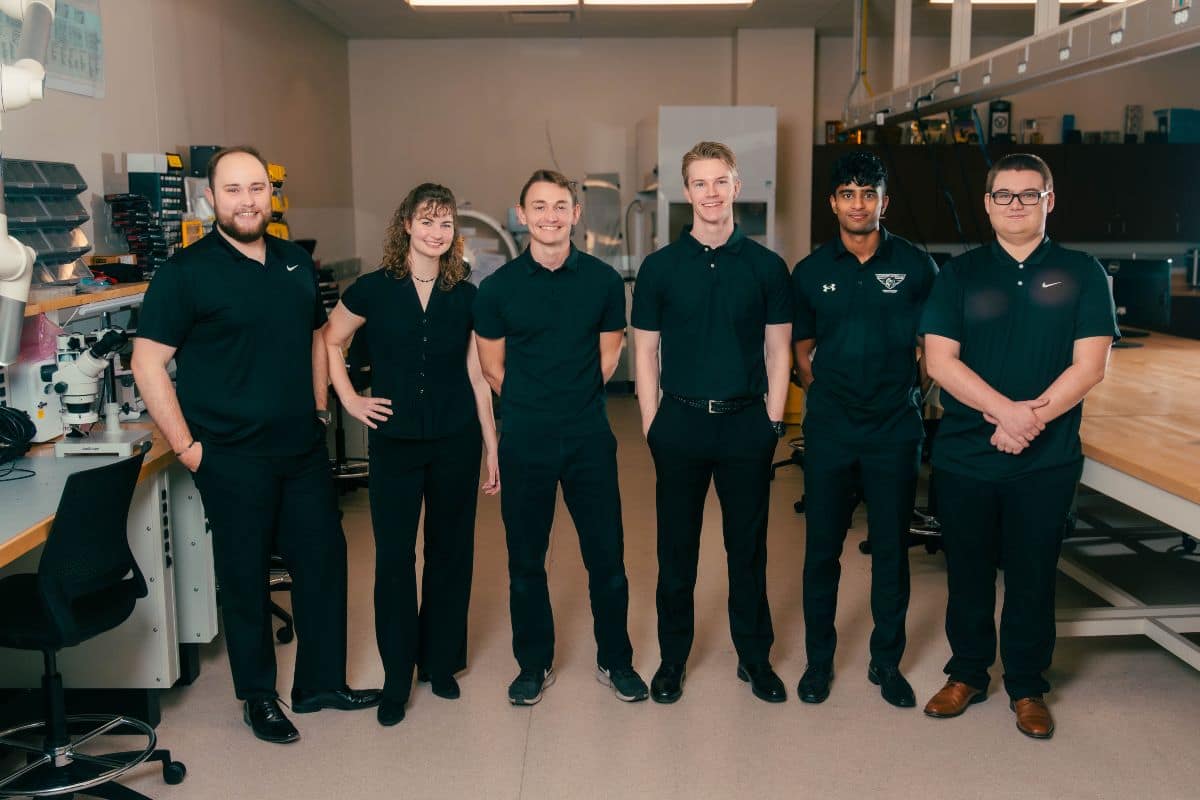Student Team Works With Lockheed Martin to Enhance Cellular Security Networks

Thanks to a philanthropic donation from Lockheed Martin, a team of student researchers from Embry-Riddle Aeronautical University’s Prescott Campus are developing a Cellular Intrusion Detection (CID) system designed to detect the presence of unwanted cellular devices within secure areas.
At a recent internship with the company, Electrical Engineering senior Zachary Traynor learned how multi-level security checks and clearances protect confidential information and products. Soon, however, he began imagining ways that bad actors might circumvent those security efforts — such as leaving cell phones outside of rooms to listen in on private conversations or infecting networks with viruses.
“Preventing unauthorized cell phones from being carried into secured areas is essential in protecting this sensitive data from potential espionage or data breaches,” said Traynor.
Strengthening Security Through Hands-On Research
“The integration of a CID system is crucial for defense companies,” said Traynor. “Not only to shield against information leakage and cyber threats but also to ensure compliance and preserve the integrity of sensitive defense operations.”
According to PwC’s 2023 Annual Industry Performance and Outlook, the aerospace and defense industry reported revenues of $741 billion in 2022. To defend against costly security breaches, Traynor and his team are endeavoring to build a working CID system this semester, supported by grant funding.
“[Lockheed Martin] believes that our project has applications that would benefit the entire aerospace industry,” said Traynor.
Pursuing the work as part of his senior capstone, Traynor is collaborating with Computer Engineering and Software Engineering majors on the project.
“The CID system could easily be broken into several capstone projects on their own,” Traynor said, citing digital signal processing, networking solutions, mechanical housing, navigational algorithm development and machine learning as part of the project. “We really wanted to push ourselves.”
“The machine learning has been complicated,” Traynor admitted. “We conducted a thorough comparison study to evaluate various radiofrequency data types for signal classification purposes.”
Ultimately, the team built upon research published over the past three years in the Institute of Electrical and Electronics Engineers to target a machine learning model that could process large datasets.
Career-Building Experiences at Embry-Riddle
Dr. John Sevic, associate professor in the College of Engineering who also serves as the project’s faculty advisor, has seen the value internships and research can have on a student’s future career.
“The senior capstone sequence is an important component of modern engineering education and for preparing graduates for industry,” said Dr. Sevic. “Sponsorship further enhances project realism by providing real-world context and an opportunity for seniors to collaborate with industry leaders.”
The CID system, currently in the assembly stage of development, is poised for demonstration in April 2024.
“At the end of our project, we aim to have a working proof of concept,” said Traynor.
The team has also been documenting their progress in a report that, at the project’s completion, will be submitted to Lockheed Martin.
“While it’s unlikely that Lockheed Martin will directly implement our prototype into their existing security infrastructure, the insights and advancement from our project could inform future development efforts,” said Traynor.
Reflecting on his path so far, Traynor credits the opportunities Embry-Riddle provides for its students as contributing to his and his team’s success so far.
“My experiences at Embry-Riddle have been absolutely amazing,” Traynor said. “Such an ambitious project would not be possible without the amazing faculty at the Prescott Campus.”

 Keaton S. Ziem
Keaton S. Ziem